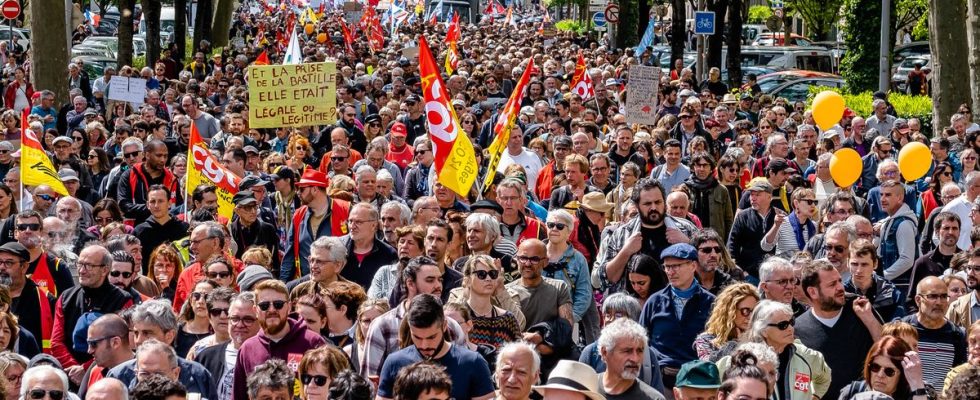Even if the record levels of the end of January, when nearly 1.3 million people had marched according to the Ministry of the Interior, have not been reached, opponents of the pension reform have continued to descend en masse in the Monday street. According to the police, nearly 800,000 people demonstrated throughout France during a “combative” May 1, marked by violence and an inter-union still united.
The mobilization during this first unitary Labor Day since 2009 therefore remained strong after 12 days of parades and well beyond a classic May 1st. The Ministry of the Interior counted 782,000 demonstrators, including 112,000 in Paris. The CGT claimed 2.3 million demonstrators, including 550,000 in Paris. They were 94,000 in the capital according to a count by the firm Occurrence.
The unions have “false all the forecasts”
“It is a very strong day which shows the determination to obtain the withdrawal of the pension reform. We made all the predictions lie since the government announced that there would be a demobilization ”, rejoiced the general secretary of the CGT, Sophie Binet on BFMTV. “It’s a big May Day. It is not a last stand, it is the challenge of the world of work to this reform, ”also underlined the leader of the CFDT, Laurent Berger, at the start of the Paris demonstration.
If the mobilization was strong in Paris, the police also counted 16,300 demonstrators in Caen, 15,000 in Brest or 14,000 in Clermont-Ferrand. And all over the country, after more than three months of conflict, the demonstrators still said they were as determined to obtain the withdrawal of the pension reform.
On the other hand, the parades were marked by sometimes violent clashes in several cities in France, and mainly in Paris, Nantes and Lyon. “In many cities in France, May Day was a moment of responsible mobilization and commitment. The scenes of violence on the sidelines of the processions are all the more unacceptable. Support for our law enforcement,” Prime Minister Elisabeth Borne tweeted.
Hundreds of “black blocks” in Paris
“If the vast majority of demonstrators were pacifists of course, in Paris, Lyon and Nantes in particular, the police face extremely violent thugs who came with one objective: to kill cops and attack the property of others”, for his part denounced on the same social network the Minister of the Interior. In Paris, “a police officer was seriously injured, burned following a Molotov cocktail jet”, continued Gérald Darmanin, who then reported 108 police officers and gendarmes injured and 291 arrests in France.
In the capital, the violence intensified when the pre-cortège arrived at Place de la Nation, the end of the parade. Hundreds of “black blocks” notably used fireworks in direct fire at the police, who responded with a lot of tear gas and defensive grenades. The police headquarters reported in the evening 111 arrests and 25 injured among the police, including 24 taken to hospital.
In Nantes, the clashes, which lasted a good part of the afternoon, left five injured, including a gendarme and a demonstrator hit in the hand, according to the prefecture. The authorities have also reported 54 arrests in Lyon, 31 in Besançon or 23 in Bordeaux.
Differences within the union
Emmanuel Macron gave himself on April 17 “100 days of appeasement” and “action” to relaunch his five-year term. With this in mind, Elisabeth Borne will send invitations to the unions “in the coming days”, according to the Minister of Labor, Olivier Dussopt.
For their part, the unions now have “two deadlines in their sights” according to Sophie Binet: May 3, when the Constitutional Council will decide on a second request for a referendum of shared initiative (RIP), and especially June 8, when he bill from the group of deputies Liot repealing the reform will be on the menu of the Assembly and could serve as the reason for a new day of demonstrations.
In the meantime, the challenge for the intersyndicale will be to remain united as differences begin to emerge in the face of invitations from the executive to resume dialogue on other work-related topics. Already, Laurent Berger has announced that the CFDT “would discuss” with the Prime Minister if she was invited, while Sophie Binet recalled that the inter-union had planned to take the decision “together” this Tuesday morning.

